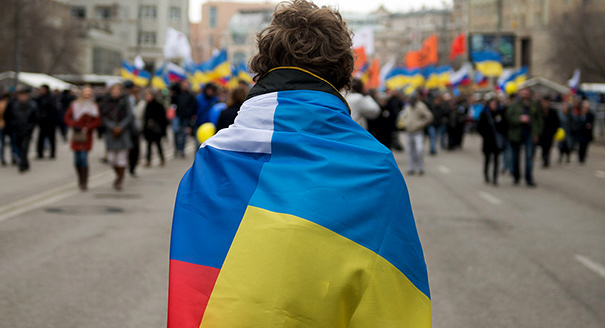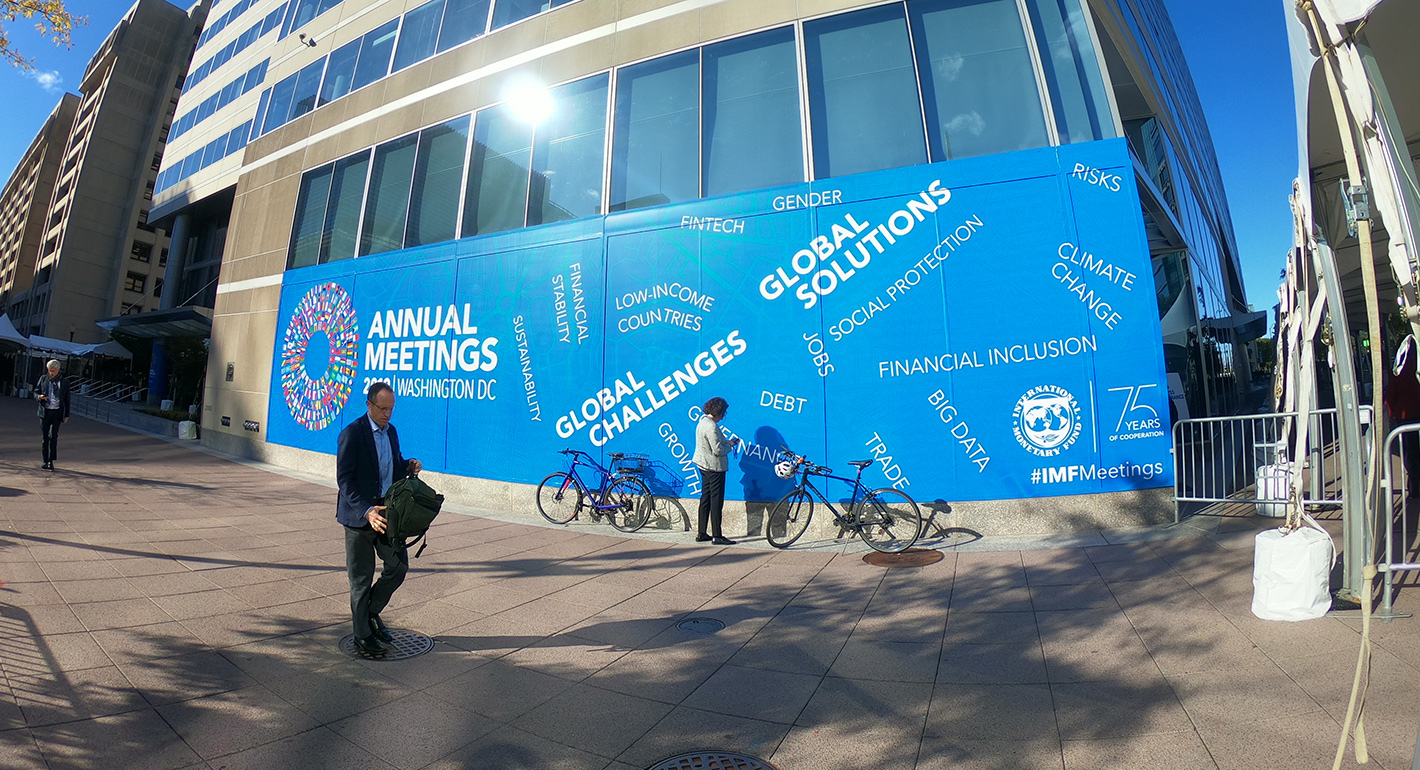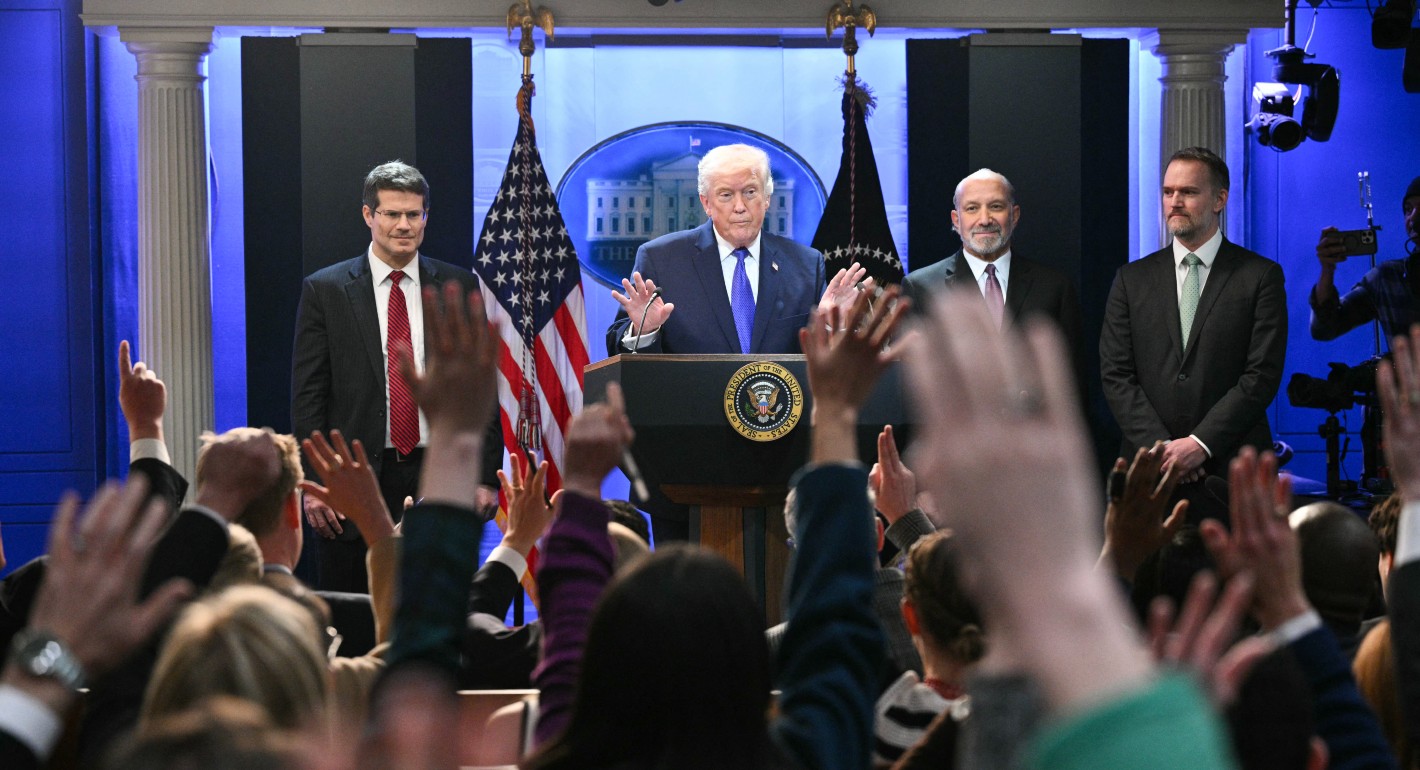Dmitri Trenin
{
"authors": [
"Dmitri Trenin"
],
"type": "commentary",
"centerAffiliationAll": "",
"centers": [
"Carnegie Endowment for International Peace",
"Carnegie Russia Eurasia Center"
],
"collections": [],
"englishNewsletterAll": "",
"nonEnglishNewsletterAll": "",
"primaryCenter": "Carnegie Russia Eurasia Center",
"programAffiliation": "",
"programs": [],
"projects": [],
"regions": [],
"topics": [
"Economy"
]
}
Source: Getty
Russia and Ukraine: From Brothers to Neighbors
Russia is parting ways with both Ukraine and Belarus. This did not have to be a tragedy with Ukraine, and can still be handled amicably with Belarus. Moreover, an independent Ukrainian state and a Ukrainian political nation ease Russia’s transition from its post-imperial condition and facilitate the formation of a Russian political nation.
The Ukraine crisis is usually seen as an act of final liberation of the second largest former Soviet republic from imperial Russia. The significance of the reverse effect, of Russia finally drawing the border between itself and Ukraine, is often overlooked. Yet its importance is huge.
It closed the books on the post-imperial period in Russia’s recent history, which still held out hopes for some sort of meaningful reintegration of the former Soviet republics around the Russian Federation. Instead, the separation from Ukraine and the breakdown in relations with the West have ushered in a wholly new era in which the Russian Federation asserts itself as a self-standing multiethnic nation-state in the middle of the mega-continent of Greater Eurasia.
In this setting, the other countries of the former Soviet Union, not just Ukraine, are simply geographical neighbors, rather than “little brothers” in an extended family run from Moscow. For Russia to succeed in its relations with these countries, it needs to learn the lessons of Ukraine.
The Ukraine crisis put Russian foreign policy to a severe test. For more than two decades prior to it, Russia did not take its largest post-Soviet neighbor very seriously. It preferred to deal with a range of pressing specific issues rather than the country behind them. Ukraine was first reduced to the issue of the transfer of the Soviet nuclear weapons to Russia, then to the division of the Black Sea Fleet, and finally to the gas transit to Europe. Ukraine itself, with its complexities and problems, fell through the cracks.
Russians often idealize the history of their relations with Ukraine, which was seen as an extension of Russia itself, linked to it by a multitude of age-old and seemingly unbreakable bonds: an unalienable part of the “Russian world.” What they miss is the implications of the different paths that the development of Russian, Ukrainian, and Belarusian nations took as a result of the first of the three spending a quarter millennium under the “Mongol yoke,” and then rising to shake it off and build an empire of its own, and the two others being absorbed at the same time into eastern European states before being incorporated into the Russian empire.
The common Russian view portrays Ukraine’s independence as something unnatural and pernicious, and striving for it as a betrayal not only of Russia’s but also of Ukraine’s own interests. The emphasis in the Russian narrative has always been placed on what is shared, on what brings the Eastern Slavic peoples together, such as common faith and common history, with far less attention being paid to their differences. Thus, Ukrainian nationalism was summarily defined as an enemy rather than a product of historical development.
Vladimir Putin has repeatedly stated that “Russians and Ukrainians are one people.” Even if it would be difficult indeed to distinguish between any number of Russians and Russian-speaking Ukrainians, this view does not include many Ukrainians who do not want to look and sound like Russians, and it certainly excludes Ukrainian elites, wherever in the country they come from, who insist that Ukraine is not Russia, in the words of the supposedly most “pro-Russian” second president of Ukraine, Leonid Kuchma.
Many in Moscow viewed Ukraine’s 2004–2005 “Orange Revolution” primarily in terms of a new political technology of “color revolutions” launched by Americans in order to expand their geopolitical influence. It was also interpreted as a dress rehearsal of a potential regime change in Moscow. Purely Ukrainian roots of the revolution were dismissed as secondary. The failure of the “Orange” leaders to deliver on their promises only produced schadenfreude and complacency in Moscow.
Rather than waking up to the challenge and working with political, business, and society forces in Ukraine, all the way to the regional level, to build a strong constituency for an independent Ukraine that would be friendly to Russia, the Kremlin continued to play with corrupt Ukrainian politicians. Many in Moscow interpreted the 2010 election of Viktor Yanukovych, the loser of the 2004 race, as Ukraine’s president, as a revenge for the past setback, and a down payment on the future integration of Ukraine into a unified economic, political, and strategic space shared with Russia. That Yanukovych only cared for his own family interest and was cynically exploiting Moscow’s dreams—as well as Europe’s hopes—was conveniently ignored.
Vladimir Putin made Ukraine’s integration with Russia a centerpiece of the foreign policy program as he prepared to return to the Russian presidency in 2012. It even would be fair to say that the success of Putin’s entire Eurasian integration project depended on Kiev aligning itself, economically as well as politically, with Moscow. To achieve that, the Kremlin worked hard, but exclusively with Yanukovych and his government. Yet neither the “pro-Russian” Ukrainian president nor his oligarchical allies wanted that: their game was milking both Russia and the West for their own benefit.
Russia’s policy toward Ukraine just before the 2013–2014 crisis is generally seen as a signal failure. Indeed, Russia was unable to prevent the overthrow of Viktor Yanukovych by the Kiev Maidan—and was unable to provide, at the very least, a political counterweight to the new “Maidan” authorities in the form of a cross-regional alignment of the predominantly Russian-speaking southeastern Ukraine. Concentrating exclusively on relations with the Ukrainian top leadership and mistaking political technologies for real politics, Moscow did almost nothing to empower those elements in Ukraine that were friendly to Russia—with the important exception of Crimea.
Yet, in bitter irony, the cost of the failure of Russia’s Ukraine policy has turned out to be lower than the entirely unaffordable cost that would have been incurred had it been a success. This perhaps is the most damning judgment on that policy.
Had Yanukovych in 2013 unambiguously taken Russia’s side and agreed to Ukraine’s full participation in the Eurasian Union, Russia would have received a restive country with a population of 45 million that it would have to materially support to a significant degree and for an indefinite period of time; Kiev would have received the opportunity to “sell,” for a high price, its agreement to any decision taken within the framework of the Eurasian Union; and, at the end of the day, despite all the support provided, Russia would have had to—most likely again through conflict—let Ukraine go.
Had Yanukovych at the beginning of 2014 done what many in Moscow expected from him—clamping down on Kiev’s Maidan crowd and imposing a state of emergency in the country—the result would still have been the outbreak of a civil war in Ukraine. Rather than in the east, in Donbass, it would have broken out in the west of the country, where a new Western Ukrainian “people’s republic” would have appeared, complete with guerillas. Yanukovych would have been forced to begin his own “anti-terrorist operation” in order to suppress them. It’s unlikely that he would have been successful: in his day, not even Stalin could stamp out the Galicia guerilla resistance. Poland and NATO wouldn’t have openly interfered, of course, but they would have aided the insurgents—not, of course, just morally.
Ukraine, in the meantime, would have been subjected to Western sanctions, and Russia would have had to compensate for the losses these would have caused. In this scenario, Russia itself would also have been placed under sanctions, and it is likely that they would be harsher than they are at present. The “support of a repressive puppet regime in Kiev” would have come at a high price. To reinforce the position of this shaky regime, Russia would have to extend security assistance to Ukraine, including a dispatch of special forces units and personnel.
Such interference, in turn, would have provoked a great deal of discontent and mass resistance, and not just in Western Ukraine. As a result, Moscow would have found itself caught in a trap from which it wouldn’t be able to get out without destabilizing the Russian Federation itself. Despite all its dangers and complications, the actual situation today is far more favorable for Russia than what the presumed “successes” of its policies would have offered.
The main reason for the failures of Russia’s policy toward Ukraine lies in ignoring a fact that is unpleasant for many Russians: almost the entire Ukrainian elite—political, economic, cultural; western, southeastern, or Kievan, albeit to different degrees—is permeated by a spirit of national independence, a dream of completing an age-old independent Ukrainian political project, which foresees separation from Russia. Right up to 2014 there was simply no chance of such a project being implemented within the framework of a Ukraine closely linked economically, socially, and culturally to Russia, not to speak about their tighter integration.
The problem was Russia’s tremendous soft power vis-à-vis Ukraine: the much wider use of the Russian language and the richness of Russian culture, alongside opportunities offered by a much bigger neighbor, basically impeded the formation of a separate Ukrainian political nation based on distinct Ukrainian values. These are rooted in rural, peasant culture, and are alien to Russia-led urbanization, industrialization, and unification. The Ukrainian political project, in principle, can only succeed under conditions where Ukraine is isolated off from Russia to the maximum possible extent—something that has only become possible under conditions of the conflict that started in 2014.
Russia’s use of military force to seize control over Crimea and to intervene in Donbass was accompanied by talk of uniting a “Russian world” as a distinct civilizational community. This approach, however justified it might have been with regard to many shared elements of culture, was completely inappropriate for economics or politics. As a result, the concept of the “Russian world” has gone up in flames of Donbass. The idea was wholly compromised, not just in Ukraine but also in Belarus. It would be hard, and certainly ill-advised, to try to resuscitate it anywhere.
Since the start of the conflict in Donbass, the formation of the Ukrainian political nation has proceeded on a clear anti-Russian platform. It did not have to be, had Russia’s foreign policy been more enlightened. The emergence of independent Ukraine—as well as Belarus—is a natural process, something that Russia would be better off understanding and accepting as a fact.
As independent nations, Ukraine, overtly, and Belarus, less so, are tilting toward the European Union, for the same reasons as Rumanians and Bulgarians. A clever Russian policy should have seen that and offered them a concept of how to “go west” without breaking with Russia. This is too late for Ukraine, but can still be done with Belarus.
As many centuries ago, Russia is parting ways with both Ukraine and Belarus. This did not have to be a tragedy with Ukraine, and can still be handled amicably with Belarus. Russia has set course on asserting itself as an independent major power vis-à-vis others, such as the European Union and China. It has found a position for itself in the north of the great continent of Eurasia. Russia, in this context, isn’t Europe or Asia; it’s simply Russia. To paraphrase Leonid Kuchma, Russia isn’t Ukraine.
Moreover, an independent Ukrainian state and a Ukrainian political nation ease Russia’s transition from its post-imperial condition and facilitate the formation of a Russian political nation. This process sped up after 2014, and not so much due to the annexation of Crimea, but rather due to the separation of Ukraine. The official version of Russian history already regards the “main” site of the baptism of Rus, the Russia of old, as being Chersonese in Crimea, and the cradle of Russian statehood as being Novgorod. “The mother of Russian cities,” Kiev, no doubt, over time will come to occupy a position in the Russian public consciousness akin to that occupied by Constantinople-Tsargrad, which so beguiled the Russian elites from Catherine the Great to Nicholas II.

About the Author
Former Director, Carnegie Moscow Center
Trenin was director of the Carnegie Moscow Center from 2008 to early 2022.
- Mapping Russia’s New Approach to the Post-Soviet SpaceCommentary
- What a Week of Talks Between Russia and the West RevealedCommentary
Dmitri Trenin
Recent Work
Carnegie does not take institutional positions on public policy issues; the views represented herein are those of the author(s) and do not necessarily reflect the views of Carnegie, its staff, or its trustees.
More Work from Carnegie Endowment for International Peace
- The Gulf Monarchies Are Caught Between Iran’s Desperation and the U.S.’s RecklessnessCommentary
Only collective security can protect fragile economic models.
Andrew Leber
- Duqm at the Crossroads: Oman’s Strategic Port and Its Role in Vision 2040Commentary
In a volatile Middle East, the Omani port of Duqm offers stability, neutrality, and opportunity. Could this hidden port become the ultimate safe harbor for global trade?
Giorgio Cafiero, Samuel Ramani
- Beijing Doesn’t Think Like Washington—and the Iran Conflict Shows WhyCommentary
Arguing that Chinese policy is hung on alliances—with imputations of obligation—misses the point.
Evan A. Feigenbaum
- Getting Debt Sustainability Analysis Right: Eight Reforms for the Framework for Low-Income CountriesPaper
The pace of change in the global economy suggests that the IMF and World Bank could be ambitious as they review their debt sustainability framework.
C. Randall Henning
- How Middle Powers Are Responding to Trump’s Tariff ShiftsCommentary
Despite considerable challenges, the CPTPP countries and the EU recognize the need for collective action.
Barbara Weisel







